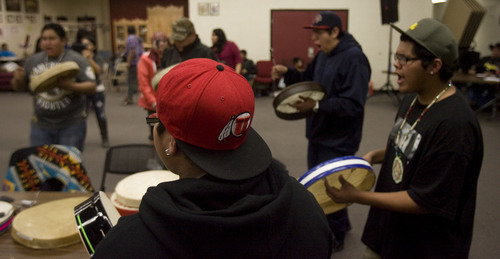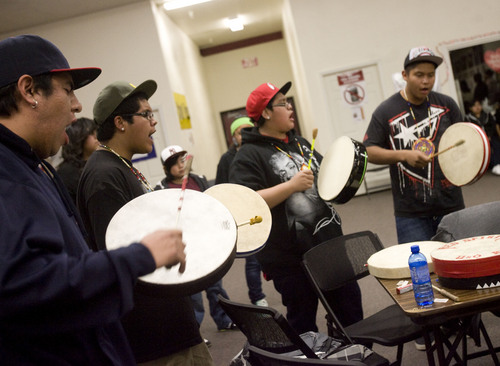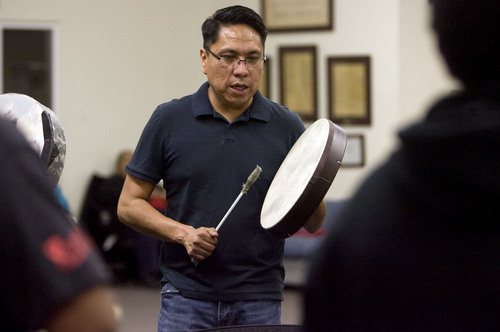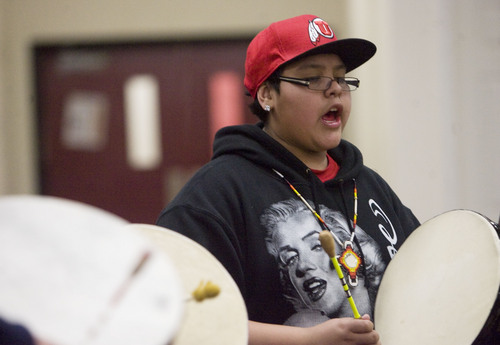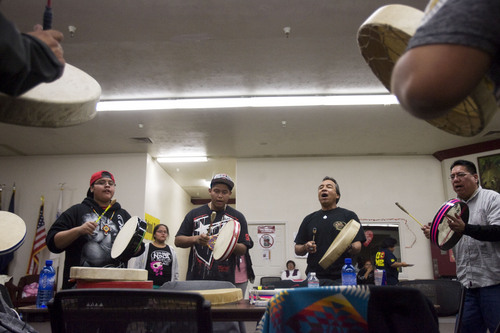This is an archived article that was published on sltrib.com in 2014, and information in the article may be outdated. It is provided only for personal research purposes and may not be reprinted.
Mascots die hard.
Across the nation, a debate rages about whether sports teams at any level — high school, college or professional — should use American Indian tribes or symbols as mascots and team names.
Unlike the University of Utah Runnin' Utes, the University of North Dakota Fighting Sioux are officially no more. Nonetheless, cheerleaders and fans are loath to give up the school's former team name, fight song and jerseys.
Facing reprisals from the NCAA after its 2007 dictum that no demeaning names or symbols of American Indians be used, the school in 2012 — after a great deal of skirmishing — put the matter to a popular vote and North Dakotans dropped the Fighting Sioux moniker. For now, the team in Grand Forks is without a name.
There is no such rule in the National Football League, however, where the Washington, D.C., franchise continues to use a name that many believe is a racial slur. As the issue continues to burn white hot, the D.C. franchise is reaching out to tribes across the country with offers of financial help in the form of economic development grants and scholarships.
In the college ranks, there appears to be no single approach to using Native American mascots. The Florida State Seminoles and the U.'s Utes, among others, continue to use American Indian names and symbols. In both those cases, however, the schools have the blessing of the tribes.
That wasn't so in North Dakota, said Bryan Brewer Sr., president of the Oglala Sioux.
"We are against the Fighting Sioux name. Many people find it insensitive," he said. "The people here are very proud of our heritage, and we don't want to be a mascot."
In the midst of the battle to drop the University of North Dakota team name, the Oglala Sioux were contacted by Washington's NFL team, whose name has been banned by many news outlets, including The Salt Lake Tribune.
"They wanted to get some dialogue going. We welcome that," Brewer said. "They would like to help the tribes with economic development."
Nonetheless, Brewer said, the name of the D.C. football team name "is very offensive, but they told us they would definitely keep it."
Where the Seminoles and the Utes are concerned, however, Brewer said it is up to the tribes. "That is something their people have decided and I'm not going to say anything against it."
—
Fighting Illini • While the Florida State and the Utah cases seem clear cut, the facts surrounding the Fighting Illini of the University of Illinois at Urbana-Champaign aren't so clear. After the 2007 NCAA ruling, the school dropped its mascot, Chief Illiniwek, but kept the team name. As it turns out, Chief Illiniwek's people were moved by the federal government to Oklahoma in the late 1800s.
But the present-day chief of the largest remaining group of them, the Peoria Tribe of Oklahoma, said the Fighting Illini is not offensive because no Native Americans ever called themselves Illini.
"The tribe made a request that they cease to use Chief Illiniwek as their mascot," said Chief John P. Froman. "But the Fighting Illini has no bearing on the Peoria Tribe."
The Peoria Tribe has not had any communication with the Washington, D.C., team, Froman said.
But the NFL franchise has contacted the Northwest Band of the Shoshone, based in Brigham City, Utah, said Chairman Jason S. Walker. Like Brewer, he finds the team's name "derogatory."
Walker explained that when Europeans were settling the eastern United States, a bounty was paid for skins of Native Americans. "That is where the term comes from," he said.
Walker and his band of the Shoshone decided not to do business with the D.C. franchise. "I chose not to meet with their organization," he said. "If you accept something from them, that means you accept their name."
A spokesman for the D.C. team directed inquiries from The Tribune to the team's official website. According to it, owner Dan Snyder established the Washington Redskins Original Americans Foundation in an effort to help Native Americans improve the lives. Snyder said he continues to reach out to Native American tribes to discuss the team's proud heritage and mascot.
—
R-word controversy • The nation's capital isn't the only place the R-word is causing a stir. The sports teams at Neshaminy High School in the Bucks County, Pa., also take the name used by the D.C. football franchise. Recently, student journalists at The Playwickian student newspaper voted to ban the term.
That caused a big stir in the school and the community, said Tara Huber, the paper's faculty adviser.
"The student journalists saw it as a racial slur and they would no longer use it," she said. "But others claim it's part of the high school's tradition and we shouldn't not use the term."
In the wake of the ban, the school board developed a policy saying the paper's student editors "are not allowed to censor or prohibit the use of the term in any article or editorial that has been submitted."
Huber added the school board's proposed policy also states: "Redskins shall not be perceived as a racist slur."
The board is slated to vote on the proposals at its May 21 meeting.
Earlier this year, the Navajo Tribal Council also voted to ban the R-word. Subsequently, however, Navajo President Ben Shelly's administration allowed the D.C. NFL team to donate to the charity golf tournament sponsored by KTNN, the Navajo Nation's radio station. In response, the Notah Begay III Foundation withdrew its support from the American Foundation Celebrity Golf Tournament in Chandler, Ariz. Notah Begay III is the only full-blooded American Indian on the PGA Tour.
Shelly was quoted in the Navajo Times as saying he was "disappointed" that the Begay foundation backed out of its sponsorship. But Shelly spokesman Rick Abasta told The Tribune that Shelly was not taking a position on the name of the D.C. football franchise.
"His disappointment was about the benefit to [Navajo] college students and is not indicative of his position on the mascot issue."
Asked what Shelly's position is on the D.C. mascot issue, Abasta said, "He has no position."


